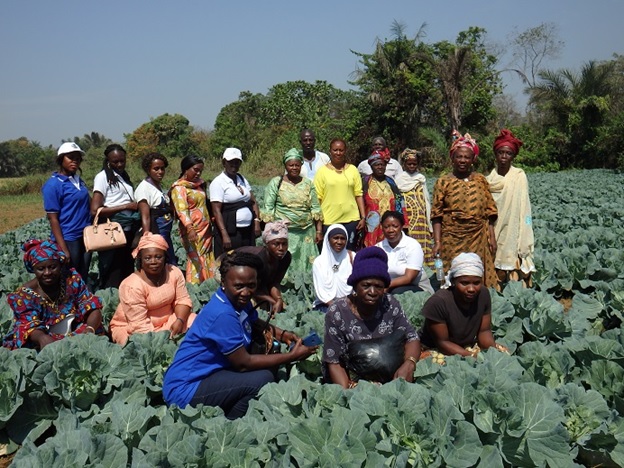By Ahmed Sahid Nasralla (De Monk)
A group of women Councilors from the Eastern Region of Sierra Leone have ended a two-day learning and exchange visit to their counterparts in Kabala, Koinadugu District, in the North of the country.
The women from the East, mainly drawn from the women in governance networks in Kenema and Kailahun districts, were interested in farming activities by the women groups in Kabala while they in turn shared their experiences in political governance.
“We see this engagement as a win-win for the women in both regions,” said Jeneba Combey, Head of Governance Project, SEND Sierra Leone, the organisers of the program with funding from Irish Aid and UNDP Sierra Leone. “Both groups shared their experiences including successes, challenges and opportunities. The women from the East are doing well in political representation while the women in Kabala are doing well in agriculture. So it’s a good learning process for both groups.”
Kabala grows most of the vegetables consumed by the country and women are the main growers.
Led by the President of the Koinadugu Women Vegetable Farmers Association, Haja Sundu Marrah, the women were taken on a conducted tour of the group’s demonstration farm of about 17 acres and later the main farm of 20 acres located seven miles away into the outskirt of the town.
According to Haja Marrah, the farm lands were donated by the Paramount Chiefs as part of their own support to the women farmers. The women farm collectively as a group, but they also have individual farms of their own. They plant a variety of vegetables including cabbage, carrot, onions, tomato and garden eggs. The group participated in a crash planting demonstration of onions while Haja Marrah explained the processes involved till harvesting time.
Most of the women in the group, which started as the Kabala Women Project way back in 1984, did not have the opportunity to go to school, but today, in the estimation of Haja Marrah, “we are degree holders because from our farming we have educated our children, especially our girls, through University and we have been able to build our own houses”.
“The majority of us pay our children’s education fees throughout from the farming we do,” continued Haja Marrah. “Not that our husbands do not want to pay, but the children are many and they could not afford to pay for all of them. Naturally, their preference will be the boys.”
Through this also, she added, they have been able to minimize conflicts usually associated with polygamous homes in which they find themselves since their parents forced them into marriage at the early ages of 13, 14 and 15.
“I was born into a polygamous home and I got married into one as well at the age of 14,” explained Haja Marrah. “My husband has two other wives; I am the third. So you can imagine how our farming activities have helped us overcome these challenges.”
However, the three times AWOL Farmer of the Year lamented lack of market for their produce as a key challenge for them.
“Our main challenge is the market. Before now when we were with FAO, they linked us with the big hotels in Freetown. We supply them by turns; some of us will supply on a Monday, others will supply on Friday and throughout the month. They calculated our supplies for the month and they paid us in dollars. That was the first time we started to earn dollars and that’s when we started building our individual houses,” she explained. “But nowadays they don’t buy from us anymore because they have put rigid criteria in place which are difficult for us to meet.”
To overcome the challenge, the Kabala women now plant more of sweet potatoes and onions and less of other vegetables. Everybody, they argue, eats onions for example and people buy them daily. Moreover, they are easy to grow and can be harvested every two weeks. Most importantly sweet potatoes and onions don’t perish easily.
Moreover, Haja Marrah is positive that the new Minister of Agriculture, Food Security and Forestry is showing concerns about their situation.
Meanwhile, the visiting delegation led by the President of the Kenema Women in Governance Network, Fatmata Dassama, shared their experiences in the empowerment of women in the Eastern districts of Kenema and Kailahun. Dassama explained the formation of the women in governance networks in Kailahun and most recently in Kenema. She noted that the foundation for their political empowerment started with the empowerment of women economically through various micro-credit schemes.
“Through the help of our main partner (SEND Sierra Leone) and donors, we benefited from micro-credit loans which enabled us to do small businesses that brought us income,” explained Dassama. “In addition, we were trained on business development, leadership, public speaking and advocacy skills. Soon we started aspiring for political office at district and national levels. Today, we are proud to boast of female Section chiefs, Town chiefs, Members of Parliament and Councilors through support from our governance network projects.”
Unlike the Northern province which includes Koinadugu District, the Eastern province has the highest number of women in political office. In the 2012 national elections, 12 women won seats as councilors in Kailahun District. After the 2018 national elections the Eastern region now boasts 25 female councilors and four Members of Parliament.
Until recently, the Northern region is renowned for its lack of opportunities for women aspiring for decision making positions at district and national level.
Rural women share experiences in farming and governance


